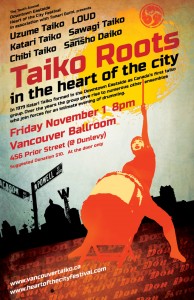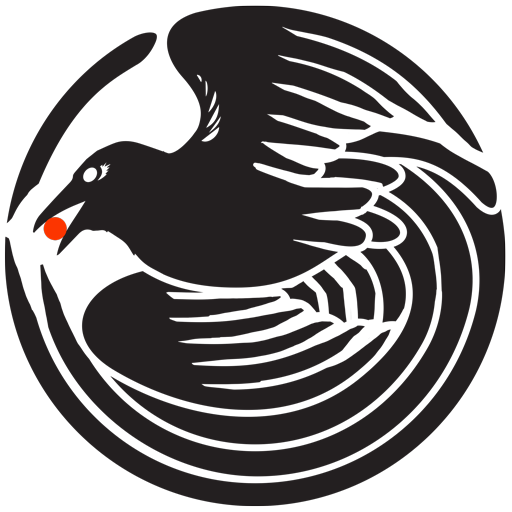 Sansho Daiko is thrilled to play two shows at the tenth annual Downtown Eastside Heart of the City Festival. On Friday November 1 we will host Taiko Roots: in the Heart of a City, a show featuring all of the Vancouver-area groups with a direct connection to Katari Taiko – Canada’s first taiko group. John of course was a founding member of that group, as well as Uzume Taiko, Canada’s first professional taiko group. See article below from The Bulletin. It’s going to be fun evening that showcases many different approaches to taiko. So join us, have a drink or two, and get your world rocked!
Sansho Daiko is thrilled to play two shows at the tenth annual Downtown Eastside Heart of the City Festival. On Friday November 1 we will host Taiko Roots: in the Heart of a City, a show featuring all of the Vancouver-area groups with a direct connection to Katari Taiko – Canada’s first taiko group. John of course was a founding member of that group, as well as Uzume Taiko, Canada’s first professional taiko group. See article below from The Bulletin. It’s going to be fun evening that showcases many different approaches to taiko. So join us, have a drink or two, and get your world rocked!
A few days later, on November 3, we will play a half hour set at the Vancouver Japanese Language School & Japanese Hall. See blurb below.
Community Celebration
VANCOUVER JAPANESE LANGUAGE SCHOOL & JAPANESE HALL FOOD BAZAAR
Sunday November 3, 12pm – 3pm
Japanese Hall, 487 Alexander
Come early to the popular semi-annual Japanese feast and eat, eat, eat! VJLS & JH volunteers work feverishly over many days to make and serve a wide variety of menu items, hot, fresh, seasonal and affordable. This fundraising event is always popular, with children’s games corner, door and raffl e prizes, and a silent auction. At 1pm, for a spicy Heart of the City Festival treat, Sansho Daiko will perform. Formed in 2010 Sansho Daiko is a Vancouver-based taiko group that draws on both traditional and contemporary repertoire, and creates a powerful and joyous sound that resonates long after the last beat has been played….Entrance to the Bazaar is by donation.
www.heartofthecityfestival.com
The Roots of Canadian Taiko: in the Heart of the City
Taiko for Tohoku – April 19, 2011, Queen Elizabeth Theatre. Photo by Koichi Saito.
The roots of taiko in Canada can be traced directly to a small but significant patch of earth in Oppenheimer Park on Vancouver’s Downtown Eastside.
Although recently covered in new grass as part of a long-overdue renovation of the park, the spot was for years a dusty baseball diamond, home of the legendary Asahi baseball team. The Asahi were the pride of the pre-war Japanese Canadian community that called Powell Street home, their prowess on the field going some way towards mitigating the racism and discrimination that the community faced on a daily basis.
The wartime relocation and internment of the Japanese Canadian community spelled the end of the Asahi and for years afterwards, the diamond held only faint ghosts of the shouts and cheers that once echoed off the buildings that frame the park.
Then, in 1977, as part of the Japanese Canadian Centennial, the Powell Street Festival was born in Oppenheimer Park. The main stage was placed over home plate, marking the return of the community to its symbolic home field, its own field of dreams.
The Centennial celebrations also sparked something in a community that had largely gone to ground, reigniting pride in a heritage that had been relegated to the back of the closet in an attempt to assimilate into mainstream society. The Festival became a yearly event, bringing together multiple generations of Japanese Canadians in a celebration of the culture that bound them together.
Music was a big part of the festival from its inception and for the 1979 Festival, the San Jose Taiko Group from California was invited to perform. The set they played that day was revelatory to those of us that witnessed it—an explosion of sound and energy that was rooted in Japanese culture yet clearly North American in its execution. For my friends and I, mostly sansei (third generation), this was unlike anything we associated with the culture of our parents and grandparents. There was nothing refined about it; instead, it was primal and somehow revolutionary. Most of all, it looked like great fun.
In the aftermath of that performance, encouraged by the members of San Jose Taiko, Canada’s first taiko group was born.
The first few practices were held in Steveston, using a drum borrowed from the Steveston Buddhist Temple and spare tires propped up on chairs. Sawed off broom handles served as drum sticks. No one had a clue what to do.
Unlike the martial arts or traditional Japanese arts like odori or ikebana, there were nosenseis, no teachers to learn from. In fact, there was no precedence. This was pre-internet, pre-YouTube. One couldn’t Google “how to play taiko.”
Seiichi Tanaka had introduced taiko to North America ten years earlier and was based in San Francisco, where he ran the San Francisco Taiko Dojo. We pooled our resources and brought him up to Vancouver for a week-long intensive at the Strathcona Community Centre. He instructed us in the basics of taiko, taught us two songs and also showed us how to make our own drums. Then he left town.
We were on our own.
Using San Jose Taiko as a model, we set ourselves up as a collective, with rotating leadership. We had endless meetings, which gave birth to our name, Katari Taiko, which literally translates as talking drums. We set ourselves up in the Strathcona Community Centre and began rehearsing three times a week.
Our first performance was in Faro, Yukon, our second (or was it our third?) was for the Queen at the Asian Centre at UBC. Not long after forming we found ourselves performing before 80,000 people at a peace march on Sunset Beach. They were heady days.
Nature abhors a vacuum, and although we had formed in a kind of vacuum, it wasn’t long before we were being invited to perform for other Japanese Canadian communities across the country, giving workshops to those interested in forming their own groups. As groups started to form in cities like Toronto, Winnipeg and Edmonton, we began to realize that we were part of a vanguard, that taiko was a movement that had taken on a life of its own.
Katari Taiko was the only game in town for quite a few years but as time wore on, restlessness set in. Shinobu Homma and Lucy Komori relocated to Toronto where they formed Wasabi Daiko. In 1988, Eileen Kage, Leslie Komori and I left to form Uzume Taiko, Canada’s first professional taiko group. In 1990, Eileen and Leslie left to help Linda Uyehara Hoffman, Joyce Chong, Lisa Mah, Sachiko Yamaguchi and Alisa Kage form Sawagi Taiko, Canada’s first all-women taiko group and then in 1996, formed LOUD with guitarist Elaine Steff. Shinobu and Lucy returned to Vancouver and formed Chibi Taiko, Canada’s first children’s taiko group in 1993. This year Chibi Taiko celebrates its 20th Anniversary with a performance at the Vancouver Playhouse (see related article).
Today, 34 years after Katari Taiko set out to change people’s perceptions of Japanese Canadian culture, the world has changed. Taiko is used to sell beer and cars. There are groups all across the country. In Vancouver alone there are ten or so groups, including one based in Okinawan eisa drumming.
Yet still, we return, year after year, to Oppenheimer Park, to the Powell Street Festival, to the roots of Canadian Taiko. Those roots run deeper than ever, with drummers who started out as young kids with Chibi Taiko now in their twenties, taking taiko in Canada to a whole new level.
No longer a novelty in a time when music from all over the world can be accessed with the click of a mouse, taiko as a uniquely Asian/North American artform continues to mature and develop.
In 2011, following the earthquake and tsunami that devastated the Tohoku region of Japan, members of all the Vancouver-area taiko groups came together under the banner Taiko for Tohoku to perform and raise funds for the relief effort. For those of us who were there at the beginning it was powerful to share the stage with so many other drummers.
The Taiko for Tohoku collaboration set the stage for more collaboration between Vancouver-area taiko groups. On Sunday, September 22, members of five Vancouver-area taiko groups banded together to perform at the Walk for Reconciliation as 70,000 people marched in the rain to support First Nations residential school survivors. For those of us who had been there in the early days, there were powerful echoes of the Peace Marches of the early eighties and a feeling that we were part of something bigger.
The Vancouver Taiko Society (VTS) was formed in 2003 with the long-term goal of serving as an “umbrella” organization for taiko in British Columbia. A non-profit organization comprised of representatives from several of the city’s taiko groups, the VTS looks to build upon these collaborative efforts as a means of fueling collective energy and promoting further collaborations.
Taiko was born out of the regeneration and re-energization of a community, rooted in history, shared culture and the desire to give voice to a generation. Those roots, stretching out across the country and the world, remain healthier and stronger than ever.

